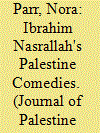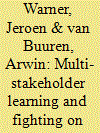| Srl | Item |
| 1 |
ID:
166899


|
|
|
|
|
| Summary/Abstract |
Conceptually linked, noncontiguous, and undeniably national, Ibrahim Nasrallah's book series Al-milhat al-filastiniyya (The Palestine Comedies) breaks conceptual ground. Told across twelve volumes, the Comedies represents the long-called for Palestinian national novel, though in unconventional form. The series uses diverse literary devices, including intertextuality and the archetype of the twin, to demonstrate how formal innovations can redirect assumptions about what constitutes not only a national novel, but also a nation. The series reimagines relationships between space, time, and people, giving narrative shape to a community so often imagined as fragments. Abandoning the retrospective prerequisite of bounded sovereign space and homogeneous, linear time, the Comedies imagines a “nation constellation.” A close examination of two novels within the series, A'ras amna (2004) and Tifl al-mimhat (2000), shows how Palestinian relationships can be imagined outside existing national logics. It reads the constellation as an alternative nation form that can both encompass colonial frameworks and free the delimitation of Palestine from the dominance of power structures that only begin with the nation-state.
|
|
|
|
|
|
|
|
|
|
|
|
|
|
|
|
| 2 |
ID:
088935


|
|
|
|
|
| Publication |
2009.
|
| Summary/Abstract |
This article analyzes the history of conflict and cooperation on the river Scheldt. Dutch-Flemish relations over the shared Scheldt estuary go back for centuries. Only in the past 10 years has there been intensive negotiation on a joint vision for its future which takes the form of a cooperative multi-stakeholder platform incorporating public, private and NGO representatives. Yet, relations have not always been cooperative; negotiations have been tense at times. After discussing the merits of a learning- versus a fighting-oriented analysis and capturing its dynamics in a TWINS matrix, this study proposes an approach that combines collaboration with competition, or learning and fighting. The case analysis finds that relations were often conflictual and cooperative simultaneously and warns against undue optimism about the multi-stakeholder process on the Scheldt estuary.
|
|
|
|
|
|
|
|
|
|
|
|
|
|
|
|